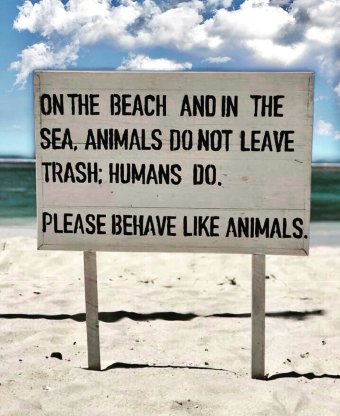In my social media feeds, this picture has been appearing a lot lately:

Image credit, instagram: @guarl351
Because I read “plastic trash” where it says “trash”, my mind entered the following train of thoughts.
First, please do not behave like animals. Animals may not leave plastic trash, but they are extremely unhygienic, and they behave violent towards each other. Why would disease and violence on the beaches be better than (plastic) trash ? For some reason the first solution often launched towards any man-made problem is to return to the natural state of things. But, “natural states of things” involve: Disease, Violence and early Death. Why is that so hard to remember ?
So in moving away from this natural state of things humans invented plastics. Which became so popular we created a pollution problem. This particular problem makes for very descriptive emotion evoking pictures of animals stuck in plastic products like Seals in fish nets and turtles in six-pack holders. Which is bad, and should be dealt with in terms of reducing our consumption of single use plastic products.
But for some reason plastic pollution is bundled together with environmental problems. Over-consumption is a problem where plastic products play a large part, yes. But, consumption is a general environmental problem because the energy spent making new products exhausts our resources and increases the CO2-levels in the air. Plastics as a specific product, is not in itself an environmental problem. It’s a pollution problem. There’s a difference.
Most plastic products break down very slowly. For all practical purposes it’s almost inert. It’s ugly yes, but except for the poor turtle in the six-pack ring, not very harmful.
As a result of its inertness, the carbon (that came from oil and gas originally) in plastics is not released into the air as CO2 unless we actively break it down. Which means that plastic products often are more environmentally friendly than alternative materials like paper. Especially if you reuse it a couple of times and don’t burn it afterwards.
So I’ll end my train of thought by quoting Susan Ruffo who points out another one of the pitfalls we humans constantly happily jump into.
“You know,” she says, “we have a history as a species of solving one problem with great intensity, only to figure out that we’ve created another one.”
And, conclude by appealing to everyone to be human, not succumb to animal behavior like over-consumption, and to keep using the (plastic) solutions that so effectively removes us from the natural state.

